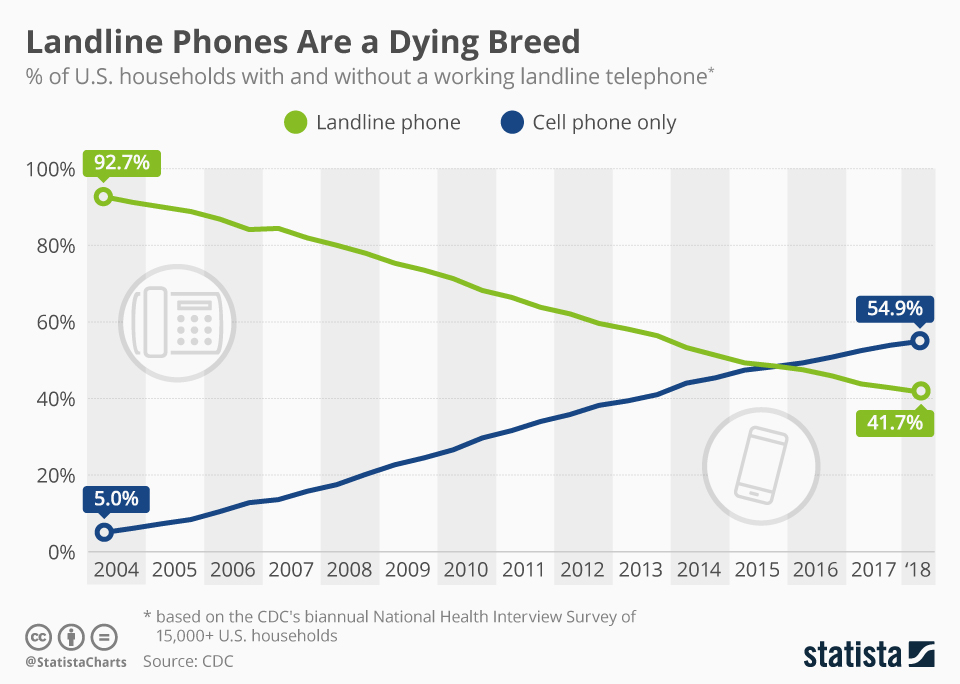Landlines? Who needs them?
By Morf Morford
Tacoma Daily Index
It has been said that the best technology is the one that literally cannot be improved.
The well-known number 2 pencil is often placed in that category. Over generations, the familiar yellow pencil has withstood competition from plastic or mechanical challengers.
Sometimes I wonder if telephone landlines might be one of those rarest of all things on our technological/media landscape – a product that is more reliable, effective and even cheaper than its more technologically advanced potential replacements.
And yes, I recognize that landlines are very much age defined; as of December 2019, almost 60% of people age 45 and older had a landline.
But I am convinced that young people (under 45) – and the rest of us – are losing something when we leave landlines far behind.
It might sound ridiculous at first, but how many of us have our family phone number irreplaceably embedded in our memories?
The jumble of numbers that we call or have as our own is no match for that number that stood as a central reference point for home and family for decades.
Back in those barbaric days, there was no telling who would pick up the phone when someone called – and there was no caller ID so the person calling was also a mystery.
With “smart” phones there is no mystery (except those panicked moments when you can’t find your phone).
Not being able to find your phone would virtually never be an issue with a landline.
But why do we even call these “smart” devices “phones”? (1*)
The “phone” of 2020 has features from texting to GPS to photography and video that make the old style phone attached to a wall seem like a clunky device from another century (which is actually mostly true).
But I think the reality is that the two devices are actually completely different products with only a tiny area of overlap.
The device connected to a place, by extension, connects us to that place.
A few years ago a cell phone company had as their marketing pitch “We connect you with a person, not a place”.
Yes, but sometimes we might want to be connected to place.
There might be times where, for example someone might be ill and you don’t want to disturb them, but you want to communicate with those who might be there – and it might not matter who.
And you might prefer a reliable connection – with no cut-outs or dropped calls.
And you, or someone you know, might not want to spend hundreds of dollars a year for the privilege of having non-stop access to YouTube cat videos.
A variety of health and home security systems work better with more stable wired systems.
Once in a great while (about once a year) some agency requires a fax. Good luck getting it to work on your smart phone.
I know that it is rare, but when the power goes out, your smart phone will only work as long as it is charged. Landlines will work semi-indefinitely.
When it comes to 911 or any emergency calls, landlines are far superior precisely because that are tied to a specific location.
Cell phones account for nearly 70% of all 911 calls in the U.S. But depending on where you live, as many as 95% of cell phones aren’t able to accurately share their location with 911 dispatchers.
In spite of all the ‘smart” features of your phone, the chance of emergency dispatchers being able to determine your location based on your cell phone’s GPS data ranges from as low as 10% to as high as 95% throughout the country.
When it comes to reliability and sound quality, about 6% of us prefer landlines over their cell counterparts – especially those who use a phone professionally, as in broadcast interviews or publicity.
Smart phones are amazing because of all that they can do, not for how well they do anything.
Yes, it’s great to have a computer in your pocket, but smart phones sacrifice comfort, audio quality and usability in order to be “all-in-one” devices (phone, computer and camera) that fit into pockets and purses.
That old clunky landline might look awkward, but that small, thin rectangle with a touchscreen is an ergonomic mess as a phone. It’s why we see people talking loudly into the bottoms of their smart phones with the screens facing skyward.
How often do you find yourself talking to your smart phone screen?
Thanks to smart devices we have millions of “butt dials” each year. Could you imagine explaining that term to a previous generation?
It is obvious which direction communication technology is going, but I can’t help feeling that something important is being lost and we won’t fully notice it until it is gone. (2*)
Over one billion cell phones were produced in China in 2019. Fewer and fewer of us are renewing our landline accounts and new construction does not always take landlines into consideration.
Personally I like landlines. You can easily step away from them. As the saying goes “When phones were tied down, people were free”.
Like most of us I’d guess, I use my phone constantly, but I can’t help wanting to be free from it.
After all, you never know what kind of technological convergence/divergence might come along next – for instance, who among us would have expected the resurgence of interest (and value) of vinyl records?
(1*) We could also ask why we call them “smart” – they have more features, but why would we ascribe intelligence to a machine?
(2*) Consumer Reports has an article on 5 reasons to keep your landline – https://www.consumerreports.org/cro/news/2014/04/5-reasons-to-keep-a-landline-phone/index.htm.







